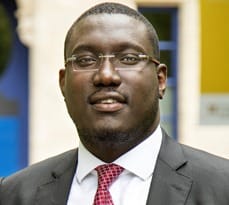Dr Othman Cole talks public-private partnership, financial services and starting his academic career aged 15.


Should private-sector companies make money from public projects? Most of us have an opinion on privatisation, often informed by the media and our own political leanings. And it’s probably based on an inaccurate picture, says Dr Othman Cole, deputy director of the Executive MBA programme at Cambridge Judge.
“Public-private partnerships are an emerging theme in my research portfolio,” says Dr Cole. One of the main issues is the allocation of risk. “If something goes wrong with the project, the private sector party won’t suffer from the downside – but they will benefit from the upside,” he notes. “Which creates a skewness in terms of risk exposure.”
It’s the need to address that risk balance that tends to make a lot of people uncomfortable, he says. “In a true partnership, the private sector should also be exposed to the downside risk. But then we have to be careful, because most of these projects are not attractive on their own and won’t bring in private capital. Governments need to step in to create incentives and structure the deal or partnership in such a way that it seems fair on all sides.”
Why is this necessary? Quite simply because most governments just don’t have the funds to develop or deliver on an infrastructure need, whether that’s in energy, transport or hospitals, says Dr Cole. “These are huge capital investment projects. Most governments are in deficit or have debt and so there’s a need to attract private capital. Dealing with that relationship is something that’s gaining a lot of traction right now.”
Classic examples include the UK’s nuclear programme public-private initiative or the HS2 high-speed railway, says Dr Cole. Another example can be seen in India: “The government of India is looking to develop a lot of projects with the private sector, local railways being one of them,” he says. “They need funds to develop new tracks and replace old stock. On their own as a government, they cannot fund this new infrastructure project and that’s where the private capital comes in.”
Dr Cole’s undergraduate degree was in computer systems engineering. “So it was totally unrelated to banking,” he says. From there, he entered the world of investment banking, landing a job on Barclays Capital’s technology team as support on the trading floor. “That’s what gave me the insight that pulled me into finance.” Then came an MSc in international securities, investment and banking at Reading, followed by an MPhil and PhD from Cambridge. “I got carried away with my academic research and I’ve stayed in academia ever since,” he says.
Currently, Dr Cole teaches cost management as well as non-interest finance on the Cambridge Judge MBA (he also teaches students on the University’s engineering programme). “I started early in my academic career because I went to university at 15,” he explains. “I came to the UK at that age from Sierra Leone, having already done my GCSEs and A-levels.”
His parents worked in the diplomatic services – his mother was ambassador of Sierra Leone to a number of countries – so as a child he travelled around and attended international schools. “I was looking to do more A-levels at 16 before going to university, but my sisters – who already lived here – asked: ‘why don’t you try it and see if they’ll accept you now?’” Thanks to the clearing system, he gained several offers and accepted a place at Warwick. By the age of 25, he had three masters degrees and a PhD.
“I’ve been at Cambridge since the early 2000s and I consider it my home,” he says – not least because he met his wife here. In 2015, his teaching in project finance won him a Cambridge Judge Teaching Award. And today, he is also a father of two – his son is almost five and his daughter is one.
Dr Cole still has a hand in the investment banking world, as partner in a firm that deals in M&A and capital raising for small-to medium-sized companies. This gives him a good balance between academia and the real world, he says – it helps bring his teaching to life and this in turn aids him in his advisory work. “It helps me convey material in a much better way, especially to executives and senior staff, and in teaching it provides the real-life touch.”
Current projects span a range of areas, among them a paper on behavioural biases that influence managers’ decisions. “What if investors are not rational, but are influenced by certain factors? You might think of your share price as low because, six months ago, it was higher, even if the fundamentals of the company have changed.” Known as anchoring, this is one example of a bias. Over-confidence is another – not in the usual linguistic sense, but in terms of having above-average expectations.
Energy is another ongoing theme in Dr Cole’s work, following on from his PhD; he has been looking at state-owned oil companies and at carbon emissions at country level, starting with a counterintuitive hypothesis. “As a country becomes more developed, its energy use will become more efficient.” In theory, at least – but China is an example of a country that has experienced rapid growth.
After Brazil hosted the World Cup, he also became interested in the impact on countries that host sporting events. “The case of Brazil now and the state of the economy makes it an interesting proposition to revisit,” he says. “Related to that is the story of Greece, which experienced unbearable sovereign debt after hosting the Olympics.” With the Olympics in Rio this year, expect him to be watching even more closely than others.

